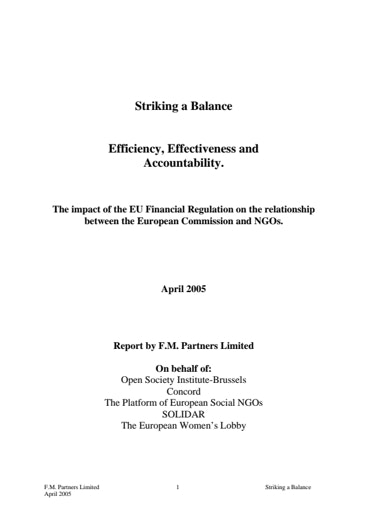Nongovernmental organizations (NGOs) play an important role in democratic society. They are key contributors to both the policymaking and political decision-making processes, complementary to democratically elected representatives and other social partners. NGOs are often the primary means of implementing sustainable development or humanitarian aid programs or programs aimed at the elimination of poverty or discrimination. This is certainly the case in the European Union, both in the member states and with the commission, where NGOs are key partners in policy delivery.
This report was born out of the widely-held belief that financial regulation of the commission, and its implementation, is harming the relationship between the NGOs and the commission because of a damaging and often inappropriate overemphasis on procedures and control.
Striking a Balance: Efficiency, Effectiveness and Accountability was co-sponsored by Open Society Institute-Brussels, Concord, the Platform of European Social NGOs, SOLIDAR, and the European Women's Lobby. The report is available for download.
Download
- Striking a Balance: Efficiency, Effectiveness and Accountability-The Impact of the EU Financial Regulation on the Relationship Between the European Commission and NGOs (453.38 Kb pdf file)
- Striking a Balance: Efficiency, Effectiveness and Accountability-The Impact of the EU Financial Regulation on the Relationship Between the European Commission and NGOs (Appendices) (796.44 Kb pdf file)
Read more
Resilience in Moldova
Q&A: Moldova’s Path to a European Future

Moldova has endured the Kremlin’s aggression because it has chosen to leave Russia's sphere of influence and supports Ukraine. The impact of the war on daily life—and why the nation is determined to join the EU.
Rethinking the EU
In an Age of Crisis, an Opportunity to Remake the EU

From climate change to rising authoritarianism, Europe is facing a range of crises that threaten the way we live. The EU must seize the opportunity to reshape how it works and rethink what role it plays in a changing world.
Corporate Responsibility
Q&A: Why (Some) Investors Want More Regulation

As the EU works on rules to protect worker rights and the planet from corporate harm, Open Society’s Jon Jacoby spoke to Anita Dorett, of the Investor Alliance for Human Rights, about how investors are pushing for change.
